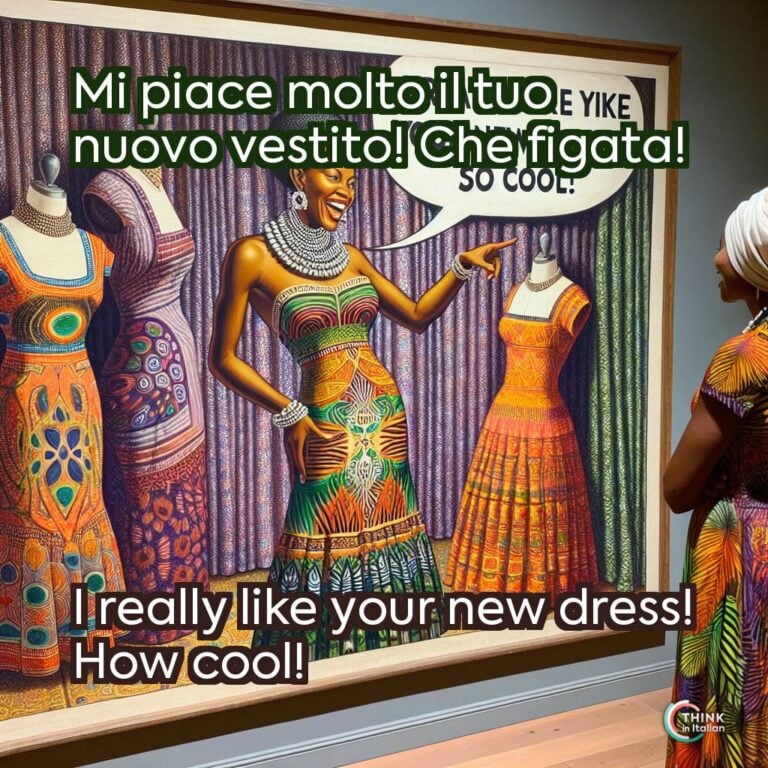Italian Slang
Italian is the official language of Italy, but I guess you have wondered at least once what language Italian speaks daily. If you want to connect with native speakers, enjoy Italian culture, and elevate your fluency, learning Italian slang is a must.
Italy’s rich tapestry of regional dialects profoundly shapes its slang. These dialects predate the country’s unification in 1861 and they are so distinct that even I, Italian from birth, struggle to understand most of them.
In general, Italian slang mirrors the country’s history and cultural shifts. It conveys camaraderie, humor, and identity. We use it to poke fun, express frustration, or assert independence.
In this article, I will guide you through the 10 most common Italian slang expressions. Be careful: they are very informal expressions, so you must know when to use them! Check the most common Italian slang words as well!
Top 10 Italian Slang Expressions
Fatti i Fatti Tuoi
Meaning: Mind your own business.
Context: Used to deflect nosy questions. Depending on the tone, it can sound playful or sharp.
Cosa stavi facendo ieri sera?
What were you doing last night?
Fatti i fatti tuoi!
Mind your own business!
Che Casino
Meaning: What a mess!
Context: Used to describe chaotic or confusing situations.
Hai visto la mia scrivania?
Did you see my desk?
Che casino!
What a mess!
Che Palle / Che Sbatti
Meaning: What a pain!
Context: Expresses boredom, frustration, or annoyance. Che sbatti is used more in north Italy, while che palle is more widespread.
Devo rifare tutto il lavoro da capo.
I have to redo all the work from scratch.
Che palle!
What a pain!
Ci sta
Meaning: It’s fine / That works.
Context: Used to show agreement or acceptance in casual situations.
Andiamo al cinema stasera?
Shall we go to the movies tonight?
Ci sta!
That works!
Che Figata!
Meaning: How cool!
Context: Expresses enthusiasm or approval, similar to “that’s awesome!” in English.
Hai vinto i biglietti per il concerto?
You won tickets to the concert?
Che figata!
How cool!
Che Schifo!
Meaning: How disgusting!
Context: Used to describe something unpleasant, gross, or revolting.
Un panino caduto nel fango?
A sandwich dropped in the mud?
Che schifo!
How disgusting!
Mi fa Cagare!
Meaning: It sucks!
Context: A strong expression of discontent or dislike.
Questa pizza con l’ananas?
This pizza with pineapple?
Mi fa cagare!
It sucks!
Notice the grammatical structure of this expression: the mi is an indirect pronoun meaning “to me”, indicating who is affected by the negative action.
In linguistics, this construction is called causative construction. It is composed of the verb fare and a verb in the present infinitive, and expresses a reaction that a subject causes in the speaker.
Meno Male
Context: Expresses relief or gratitude for a favorable outcome.
Meno male che non ha piovuto durante il picnic.
Thank goodness it didn’t rain during the picnic.
Meno male!
Thank goodness!
A Fagiolo
Meaning: Right on point.
Context: Used to describe something that fits perfectly or is spot-on.
Se compriamo questo volo aereo arriveremo alle 19.
If we buy this flight we’ll arrive at 19.
E il concerto inizia alle 21. A fagiolo!
And the concert starts at 21. Right on point!
Non me ne Frega Niente
Meaning: I don’t care at all.
Context: A strong way to express indifference. Commonly used in casual or slightly irritated conversations.
Oggi gioca la Roma.
Today Rome is playing.
Non me ne frega niente!
I don’t care at all!
Tips for Using Italian Slang
- Understand the Context: slang is informal and best used in casual settings. Avoid phrases like che palle! in professional environments, and stick to neutral expressions instead.
- Listen and Observe: watch Italian movies or listen to native speakers to understand how slang is used. Pay attention to body language and tone for added context.
- Practice with Locals: language apps work well for specific purposes, like to connect with Italians and practice slang.






